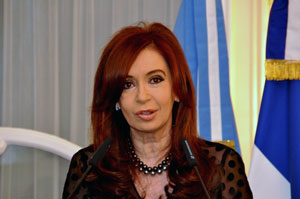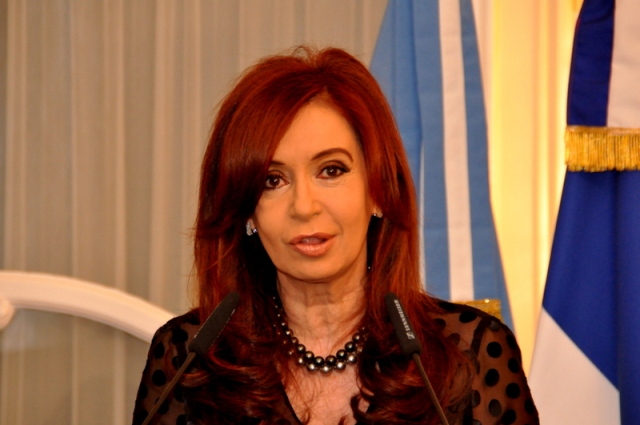Index relies entirely on the support of donors and readers to do its work.
Help us keep amplifying censored voices today.
In Argentina, media organizations take sides: for or against the government. Graciela Mochkofsky tells the story behind the turf war between President Fernández de Kirchner and Grupo Clarín.

Argentina’s President Cristina Fernández de Kirchner Photo: Demotix
Argentina has an extraordinary number of newspapers, magazines, radio and TV stations. Greater Buenos Aires, the largest urban centre where 13.5 million people live has 18 newspapers, 37 TV channels (five analogue and 32 digital), seven news channels, and 550 AM and FM radio stations. Does this mean that it is a thriving market, with highly educated, enlightened audiences, where the development of the media is directly linked to prosperity?
No. The reason Argentina boasts a huge proliferation of media organisations is strictly political.
(more…)
Attempts to push through a media law in Argentina could end up destroying one of the country’s most critical broadcast outlets. Ed Stocker reports
A bitter battle between Argentina’s largest media empire, Grupo Clarín, and the government shows no signs of ending. President Cristina Fernández de Kirchner, continues to try and force through a media law that would see the break up of the conglomerate, the most critical voice against her administration.
Three years ago Congress passed an anti-monopoly bill with broad aims of making the Latin American country’s audio-visual landscape a more democratic, plural environment. But critics argue that its real aim is to stifle dissenting voices, including Clarín.
The law has positive aspects on the surface, argued Guillermo Mastrini, a professor at Quilmes University specialising in media. He said the new bill allows non-profit organisations a third of Argentina’s much-coveted broadcast licences for the first time — potentially setting a benchmark for regional press standards.
“But the real idea that needs to be understood,” he explained, “is that the media law has been much more democratic in its drafting than its implementation. The government has used a decent law to punish broadcast media that doesn’t toe the official line.”

Argentinian president Cristina Fernández de Kirchner. Hugo Passarello Luna | Demotix
The implementation of the law has proved difficult since Clarín went to a tribunal over the constitutionality of a clause stating that companies with too many licenses — the right to broadcast in a certain region — would have to divest.
While a ruling on the constitutionality is still pending, Clarín was granted a temporary injunction. [Update 17/12: a judge has ruled this clause constitutional, and Clarín will now appeal. In the interim the federal media authority says it will now forcibly step in and start the transfer of licences.
What has ensued has been a complex and heated legal scuffle, with the government initially arguing that the injunction would end on 7 December, citing advice handed down by the country’s highest judicial body, the Supreme Court.
The government prepared for the 7 December deadline — when the law would apparently come into force — with fervour, saturating pro-government channels with adverts about a date they had renamed “7D” to give it a catchy ring. Clarín retaliated on its networks.
Then, at the last moment, an appeals court extended the injunction, despite the Supreme Court’s stance, thwarting the law once again.
For Daniel Dessein, freedom of expression president at the Argentine Association of Journalistic Entities (Adepa) group, 7D was part of the government’s increasingly confrontational stance towards the media.
“The government elected the date of 7 December as a historic and symbolic moment when the application of the law would allow democracy to triumph,” he said. “It chose a number and a letter for the day, 7D, which clearly alludes to D-Day and the Normandy invasion. The government was basically announcing an attack.”
That “attack” hasn’t gone the government’s way, and it has launched an appeal while strongly questioning the judiciary’s objectivity. The Permanent Council for the Protection of Judicial Independence, a national body of judges, in turn denounced what it called “institutional aggression” against judges.
According to Afsca, the body charged with implementing the media law, the proposed legislation isn’t singling out one group. Earlier this month, its president Martín Sabbatella said that “the spirit of Afsca has always been that no one is different and the rules are the same for everyone”.
Afsca argues that Grupo Clarín is the only media conglomerate that has refused to present divestment plans, from among the some 20 companies that exceed the new licence rule.
The media law continues to divide international opinion. The Florida-based Pan-American Press Society (SIP) sent a delegation to Argentina for the failed 7 December deadline. It later released a statement denouncing what it saw as “serious problems regarding the free exercise of journalism in the country”.
On the other hand, Frank La Rue, UN special rapporteur for freedom of expression, said on a visit to Argentina in October that the law was “a model for the whole continent and for other regions in the world”.
Clarín argues that its TV and radio stations are some of the few “independent” voices left in Argentina, a country where many stations are dependent on government advertising to stay afloat.
Advocates of the law say it provides a much-needed overhaul of legislation that dates back to the last military dictatorship (1976-83). But for Guillermo Mastrini, the turf war with Clarín is holding up its progressive elements.
“The government has focused its forces more on destroying Grupo Clarín than allowing new broadcast outlets, companies and ideas from civil society to flourish,” he said. “That is the great failure of this law.”
Ed Stocker is a freelance journalist based in Buenos Aires. Follow him on Twitter: @Ed_Stocker
Read more of his work on censorship and free expression here
A reporter was beaten to death as he entered his home in Neuquén, Argentina, on 29 April. Adolfo Salazar, journalist and owner of the FM radio station La Radio de Fito, is reported to have died from head trauma. According to local police, the motive for the killing remains unclear.
An Argentinian TV reporter and cameraman were beaten, ordered to strip and threatened with death while investigating reports of human trafficking on 29 December. Journalist Julián Chabert and cameraman Raúl Zalazar, of Channel 7 of Mendoza, said they were investigating reports of Bolivian immigrants suffering labour exploitation at an olive producing plantation when the farm’s owner locked them in the kitchen and threatened to kill them. Chabert used his mobile phone to contact the police, who rescued the pair and arrested the landowner.